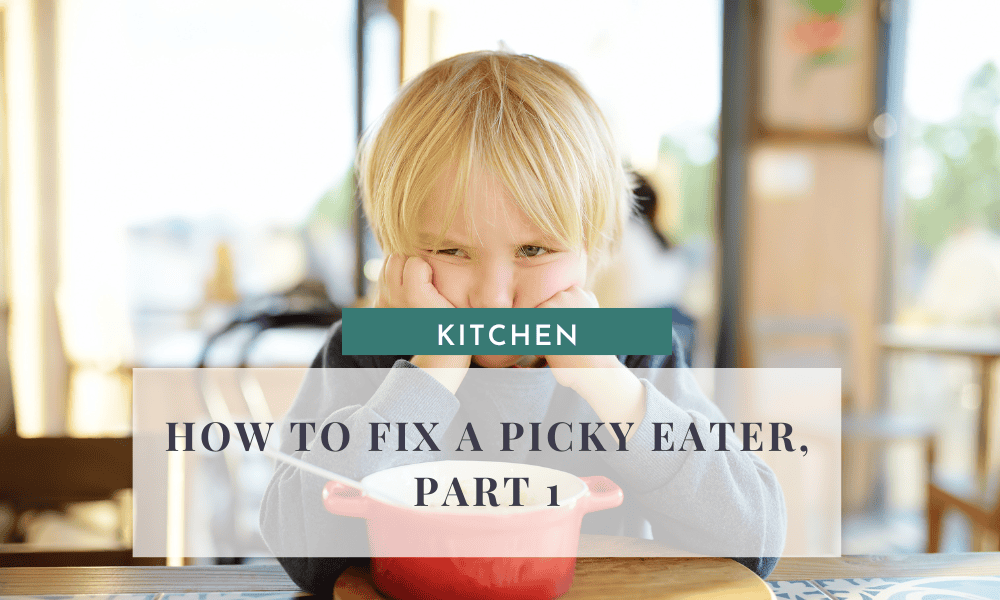Have you ever wondered why some families have all picky eaters, some only have a few, while others have none? There are actually several reasons why this happens, and the good news is, even if you have a “picky eater” right now, there is hope and change can happen.
It’s always been my belief that I am doing my children a huge service in helping them get over their pickiness and develop a wide and diverse palate. Here are my secrets.
Picky Eater Strategy #1- Parenting
Parenting strategies are really the key if you want to help your picky eater. Now, I’m not saying that there aren’t some real issues to overcome. Some children have texture issues, some children are more strong-willed than others, all of this is true. However, if you do not have a solid parenting strategy in place around food, you will always be reacting, instead of proactively setting the standards for your home (in other words…parenting).
I would like to go ahead and say that these strategies may not be helpful at all for a child who has true sensory issues. I am not an occupational therapist. So if your child truly has sensory issues that affect his or her eating, I would advise you to consult with a professional.
Let’s cover some background information about my family and my experience.
1. I was raised in a home where my brother and I (the oldest two kids) were always expected to eat what was served. We always had a protein, starch, vegetable, and fruit at every meal. We didn’t have to finish ALL of our protein and starch (but at least half), but we were always expected to finish our fruit and vegetables. My brother and I have never been picky eaters…
My younger sister and brother did not have the same expectations. A lot more convenience food was served, less fruit and vegetables, and my parents did not follow through. So if my younger brother or sister did not like carrots, they just didn’t have to eat them…not even try them.
2. I noticed the disparity between what was expected of the older children and the younger children, and decided to learn valuable lessons from that experience. I decided to handle the meals in my home the exact same way that my mother handled meals when it was just my brother and me.
A. Well-balanced meals
B. Very little processed food
C. Expected to eat what is served (no substitutions)
D. If I know that I am serving something that a particular child doesn’t enjoy, I will allow them to only take a small amount and eat more fruit and vegetables to offset, but they must still eat what is served.
E. Minimal snacking in the afternoon (only fruit and vegetables for snack in our home)
3. The majority of my children will now eat everything I serve with no problem. I have one child that is more sensitive to spicy foods so I will turn down the spice, but leave the red pepper flakes or cayenne on the table for those of us who love spicy food. My nine year old son doesn’t enjoy marinara sauce, however we have pasta with marinara sauce almost weekly. He eats a small portion and eats extra salad.
I did have to work with my son a lot to get him to the point where he happily eats the pasta. He would whine and complain, but we worked through it, and now he just eats it without a fuss.
Let’s discuss what needs to happen in the parenting realm to navigate through picky eaters and come out on the other side.
Deciding On Family Food Standards
Before you can start working on reforming your picky eater, it’s important to decide exactly what your goal is for your child. Because like all changes, if you don’t have a really clear goal to aim for, it’s hard to actually make a change.
So let’s start by defining success. This is going to look different for every family.
In our family, the food standard is to eat what you are served without complaining, but with thankfulness. We will not provide an alternative to what is being served, so while we do not mandate “cleaning the plate” it is important for the child to eat enough of what is being served to prevent hunger in 1-2 hours. If we are serving dessert that evening, then everything on the plate must be finished if the child wants dessert.
Some families may want a stricter standard, while others want something more flexible. It’s my personal opinion that as long as you are working towards helping your child learn the skill of being an adventurous eater, then your standard is just fine.
The areas that need to be defined are as follows:
1. How much of what is put on the plate will you require to be finished?
2. What do you want to teach your child to do if the food being served is not their preference? Ie. take a small 3 bite serving, eat it, and thank the cook
Enforcing Family Food Standards
Now that we have defined what the family food standards are, we need to discuss what happens when the standards are not met. Simply having standards is not enough, you will need to have a plan to enforce the standards.
There are a few different ways that work well for enforcing your food standards.
1. No dessert or snacks– this has worked quite well in our home. If you do not finish what is on your plate, then you may not have dessert (or snacks if the meal is breakfast or lunch). Dessert is not something that we serve every evening, probably only 2-3 times per week, but if I were trying to break the habit of picky eating, I would have it available every night until the habit was firmly in place. Desert is a huge motivator.
2. Saving food for the next meal– I have done this a few times for a particularly stubborn child. If he didn’t finish his dinner, I would wrap it up and serve it for breakfast the next morning. Basically, until that meal is finished, there isn’t another option. (I want to reiterate that this is not a good tactic for a child with actual sensory issues, see an occupational therapist instead) There is no arguing, bribing, begging or pleading etc. involved here. It is a simple cause and effect situation. You don’t want to finish your dinner? Okay, you may have it for breakfast. Obviously not snacking between meals for this to work.
3. Removing privileges- If your child has TV or video game privileges and values that time, removing privileges may be a good option. I would personally only use this for bad attitudes, for example, if the child eats the food, but complains or whines about it the whole time. I would give one warning, for example “We don’t complain about the food being served, if you do it again, you will lose your video game privileges for the day tomorrow.”
These are the parenting strategies you will need to start making progress in transforming your picky eater into an adventurous eater. Remember that consistency and patience are important, and that you must lead by example.
In my next blog post we will discuss food strategies that will help you to develop and broaden your child’s palate. There are definitely some things you as the parent can do to ease this transition for both yourself and your child.








Good morning Ashley.
I have a few thoughts about this picky eater thing.
I was determined my children would not be picky eaters, but I still got one that was so very picky. With her it was mostly the textures. A speech therapist shared with me some info on it. She bought every different type of whistle or similar toy she could find (a lot were from the dollar store). Each one strengthened different muscles in the mouth, and would help with speech, but also textures of food. Also, the little, pink, foam mouth cleaners that are made for kiddos actually stimulate the muscles in the mouth. This helped my daughter be able to swallow food without gagging.
All my children loved it when I would let them take my special bag of whistles and be as loud as they wanted Then I would disinfect the whistles and put them away in separate bags for each child. We did this as part of our preschool routine. To them It was a privilege:)
Also, when she was small, I couldn’t get her to eat any baby foods. In talking to her doctor about stomach issues we were dealing with , her dr. made the comment she may be associating that particular food with pain, if that food has caused pain in the past when she tried it. I definitely noticed that so I took out that food(applesauce, believe it or not!) for a while and slowly added it back in when she was older. She still can’t handle any tomato sauces, but I realized they are too acidic for her system.
Another thing, I let them have 1 food they really didnt like, but they had to eat everything else with no grumbling
Just a few ideas, maybe they will help another mother going through the same thing…
Thank you so much for sharing this information!!